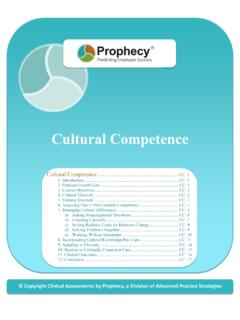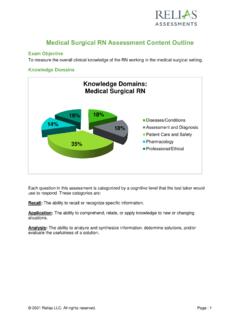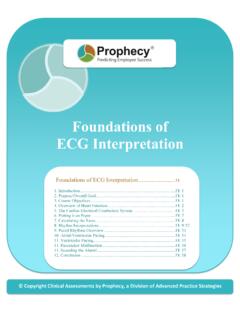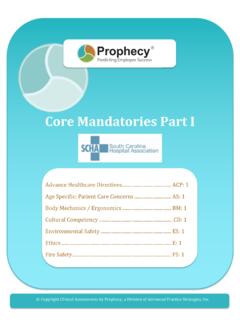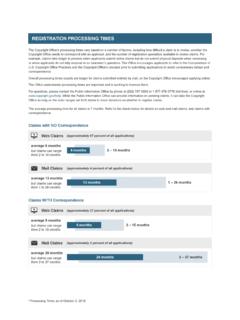Transcription of © Copyright Clinical Assessments by Prophecy, a Division ...
1 Copyright Clinical Assessments by Prophecy, a Division of Advanced Practice Strategies ET: 1. Ethics INTRODUCTION. Healthcare ethics is a set of moral principles and values that guide providers in making choices about medical care. Healthcare ethics is also called medical ethics or bioethics. Healthcare ethics involves each caregiver's sense of right and wrong, and the duties owed to patients and families. It involves four main principles: 1. Autonomy, which is to honor patients' rights to make their own decisions regarding care 2. Beneficence, which is to help patients advance their own well-being 3. Non-maleficence, which means to do no harm 4. Justice, which means to be fair and treat all patients the same Although all four principles are of equal importance, in caregiving the respect for patient autonomy often take priority over the others.
2 PURPOSE/OVERALL GOAL. This module outlines The Joint Commission's standards regarding ethics in healthcare delivery, the benefits of having an ethics program, and a new model called Integrated Ethics. The goal of this module is to assist you as a healthcare worker in delivering ethical care to patients by providing guidelines related to decision-making, patient privacy, informed consent, end-of-life care, conflicts of interest, and more. COURSE OBJECTIVES. After completing this module, the learner should be able to: 1. Explain The Joint Commission's ethical standards 2. Describe the ethical responsibilities of healthcare workers 3. Define the individual rights of patients 4. Describe the portions of the Integrated Ethics model pertaining to healthcare workers 5.
3 Describe common ethical dilemmas and how to respond appropriately ET: 2. ETHICAL STANDARDS. The Joint Commission (TJC) has produced a set of standards called Ethics, Rights, and Responsibilities. These standards serve as a guide in decision-making and healthcare delivery for providers and organizations. The goal of the Joint Commission standards is to: Ensure that care, treatment, and services are provided in a way that respects and promotes dignity, autonomy, positive self-regard, civil rights, and involvement of patients Consider each patient's abilities and resources, the demands of his or her environment, and the requirements and expectations of providers and those they serve Ensure that the family is involved in care and treatment decisions, with the patient's approval TJC standards cover three areas: 1.
4 Organizational Ethics 2. Individual Rights 3. Individual Responsibilities These three areas are described in the following sections. ET: 3. ORGANIZATIONAL ETHICS. According to The Joint Commission, organizational ethics apply to the environment in which healthcare is delivered. It involves: The responsibility that a facility has to the patients and community it serves The connection between ethical healthcare and ethical business practices The requirement that care is provided within the facility's scope, mission, and applicable regulations There are three aspects of organizational ethics: 1. Procedural justice The polices in place for decision-making should be coherent, consistent, and transparent 2. Distributive justice The fair allocation of resources, rewards, benefits, and discipline within the facility 3.
5 Professionalism The practice of upholding the moral principles and commitments valued by the profession and the public. The Joint Commission states that you as a healthcare worker should: Demonstrate respect for human dignity, honesty, integrity, and trustworthiness Demonstrate autonomy and self-regulation of your profession (such as through peer review and other processes). Participate in resource allocation decisions Safeguard confidences and privacy ET: 4. INDIVIDUAL RIGHTS. According to The Joint Commission, individual rights involve: How a facility respects the culture and rights of patients during staff interactions How the staff involves patients in care decisions The standards for individual rights include these five considerations: 1.
6 Shared Decision-Making In order to deliver the highest quality care, providers are no longer expected only to provide information to patients but to partner with patients as well. Clinicians bring their specialized knowledge of science, medicine, and technology Patients weigh that information along with their preferences, values, and experiences 2. Informed Consent Shared decision-making is documented through the process of informed consent. It means that patients have the capacity to make decisions and can appreciate their available options, and that their decisions are voluntary. 3. Advance Care Planning Advance care planning is a way to promote shared decision-making at times when patients don't have the ability to make such decisions.
7 Patients can document their wishes and/or name a proxy to make decisions about their treatments at times when they are unable to do so themselves. 4. End-of-Life Care This involves how decisions are made once the goals of care change from curative to palliative at the end of life. As a healthcare provider, your goals are: Supporting end-of-life decision-making Ensuring that decisions made are consistent with the values and desires of the patient Respecting the individual rights of patients 5. Privacy and confidentiality In addition to protecting patients' autonomy, their personal information must be protected as well. Privacy and confidentiality in healthcare refers to the protection of information that relates to: The past, present, or future physical or mental health or condition of an individual The care provided to an individual The past, present, or future payments for healthcare ET: 5.
8 INDIVIDUAL RESPONSIBILITIES. According to The Joint Commission, individual responsibilities involve the patient's role in the healthcare process. When patients are partners in care, the safety of healthcare delivery is enhanced. Some ethical decisions can be made only by the patient. Healthcare providers can inform, consult, and advise, but only the patient can ultimately decide what quality of life is acceptable to him or her. ET: 6. BENEFITS OF AN ETHICS PROGRAM. For healthcare facilities, having an ethics program in place has these benefits: Enhanced patient satisfaction Increased employee morale and loyalty Improved public relations Fewer wasteful or unwanted treatments Less diverted staff time Enhanced professionalism Fewer lawsuits Meets The Joint Commission's ethics standards Traditional ethics programs at facilities have long involved the creation of ethics committees.
9 These committees generally focus on Clinical ethics issues, particularly those relating to end-of-life care. Today there is growing interest in a new model called Integrated Ethics, developed by the National Center for Ethics in Health Care within the Department of Veterans Affairs (VA). Integrated Ethics was designed to deal with the full range of ethical concerns in healthcare today. ET: 7. INTEGRATED ETHICS MODEL. In the Integrated Ethics model, ethical concerns in healthcare are categorized into major domains. These domains were designed to cover the broad range of ethical issues faced by all types of healthcare organizations, including acute-care hospitals, rehabilitation hospitals, outpatient facilities, nursing homes, home care organizations, and healthcare systems.
10 The domains that most pertain to you as a healthcare worker are: 1. Shared decision-making with patients How well the organization promotes collaborative decision-making between clinicians and patients 2. Patient privacy and confidentiality How well the organization protects patient privacy and confidentiality 3. Professionalism in patient care How well the organization fosters behavior appropriate for healthcare professionals 4. Ethical practices in the everyday workplace How well the organization supports ethical behavior in common, everyday interactions in the workplace More about these four domains are in the sections that follow. ET: 8. SHARED DECISION-MAKING WITH PATIENTS. Shared decision-making involves how well the organization promotes collaborative decision-making between clinicians and patients.
